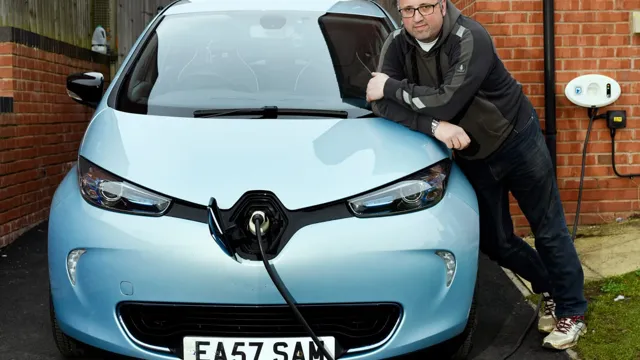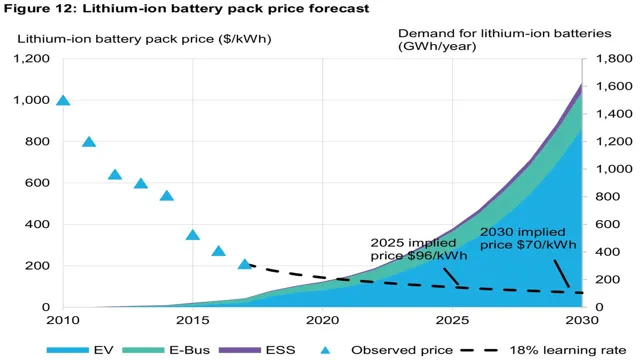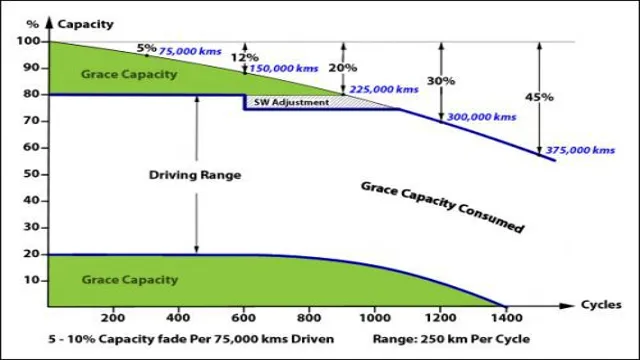Unveiling the Truth: Do Electric Cars Really Need Battery Replacements?
Are you considering purchasing an electric car, but concerned about the battery’s lifespan? You’re not alone. Many people ask the question, “Do electric cars need new batteries?” It’s a valid concern. After all, electric vehicle batteries are expansive and make up a significant percentage of the total cost of the car.
But don’t worry, we’re here to give you the lowdown on electric cars and their batteries. It’s essential to understand how long the battery lasts, how to maintain it, and when it needs to be replaced. So, let’s dive in and explore this topic in-depth.
The basics of electric car batteries
Yes, electric cars need batteries that power their engines and need to be replaced eventually. The lifespan of an electric car battery depends on various factors such as the quality, energy density, and charging patterns. Typically, the lifespan of batteries ranges from 8-10 years or 100,000-200,000 miles before they need to be replaced.
The cost of battery replacement can vary depending on the manufacturer and the battery type, but it can be expensive. However, it’s worth noting that in recent years, battery technology has significantly improved, and many electric vehicle manufacturers are offering warranties on batteries that last up to 8 years or 150,000 miles. Additionally, some innovative companies are developing second-life battery storage, allowing used electric vehicle batteries to be repurposed for home or commercial energy storage systems.
Overall, electric car batteries are a necessary but often costly component that is improving and evolving as the industry continues to grow.
How long do electric car batteries last?
When purchasing an electric car, one of the main concerns that drivers have is the lifespan of the battery. While many factors can impact the longevity of an electric car battery, the average lifespan is approximately 8-10 years or 100,000-200,000 miles. However, it’s important to note that this can vary based on how often you charge the battery, your driving habits, and even the climate in which you live.
Battery technology is continually improving, and as a result, many newer electric car models are boasting battery lifespans of up to 300,000 miles. Additionally, some manufacturers offer warranties on their batteries that cover up to 8 years or 100,000 miles, giving drivers peace of mind and protecting their investment. When considering purchasing an electric car, it’s essential to research the battery lifespan and warranty to ensure you’re making an informed decision.

Factors that affect battery lifespan
Electric car batteries are a vital component of electric vehicles that provide the required power to propel them forward. These batteries are designed to deliver a consistent flow of power over an extended period. However, several factors may affect their lifespan, such as temperature, usage, and charging habits.
When it comes to temperature, extreme heat or cold can lead to a shorter battery lifespan. High temperatures can cause the battery to degrade faster, while cold temperatures can reduce its overall performance. Therefore, care should be taken to ensure that the battery is stored and charged in an optimal temperature range.
Usage patterns can also impact the lifespan of electric car batteries. Frequent charging and discharging or driving the car for long periods without giving the battery time to rest can affect its overall performance. Additionally, heavy usage can lead to excess wear and tear, reducing the battery’s lifespan.
Finally, charging habits play a significant role in determining the battery’s lifespan. It’s best to avoid fast charging whenever possible, as it generates more heat, which can damage the battery. Instead, slow charging is recommended as it can extend the battery’s lifespan.
In summary, several factors can impact the lifespan of electric car batteries. However, maintaining optimal temperature conditions, regulating usage, and adopting appropriate charging habits can help ensure that the batteries last for an extended period, providing reliable power to electric vehicles.
Do electric cars need battery replacements?
One concern that many people have about electric cars is whether or not they will need to replace the battery at some point during the car’s lifetime. The good news is that with proper care and maintenance, electric car batteries can last a long time, sometimes even the lifetime of the car itself. Many electric car manufacturers offer warranties on their batteries that last for several years, providing added peace of mind for drivers.
However, if a battery does need to be replaced, it can be an expensive undertaking. Depending on the make and model of the car, a new battery can cost thousands of dollars. It’s worth noting that the cost of electric car batteries has been dropping in recent years as technology improves and demand increases.
So while battery replacement may be a concern for some electric car owners, it’s important to remember that with proper care, the need for replacement may not arise for a long time, if at all.
When and why to replace electric car batteries
Electric car batteries are a crucial component of electric vehicles. While it’s true that electric car batteries will eventually need to be replaced, it’s not an immediate concern for most electric car owners. The lifespan of an electric car battery depends on a variety of factors, including the make and model of the vehicle and how frequently it’s driven.
Typically, electric car batteries can last anywhere from five to fifteen years, with some high-end models lasting even longer. Still, it’s important to keep an eye on the health of your electric car battery to avoid sudden issues on the road. You can do this by regularly checking your vehicle’s battery health through an onboard system or by consulting with a trained technician.
If you do need to replace your electric car battery, it’s important to choose a high-quality replacement that’s compatible with your vehicle’s make and model. While this replacement can be costly, it’s still a viable option that allows you to keep driving your electric vehicle for many more years to come.
Battery replacement costs
Electric cars have certainly grown in popularity in recent years, but many people still wonder about the battery replacement costs. While electric car batteries can last for hundreds of thousands of miles, they are still subject to degradation over time. The good news, however, is that most electric car manufacturers offer warranties that cover battery replacement costs for a certain number of years or miles.
Additionally, battery prices have decreased significantly in recent years, making it more affordable to replace an electric car battery than it was just a few years ago. In fact, a new electric car battery can cost anywhere from $3,000 to $7,000. However, it’s important to note that the replacement cost can vary depending on the make and model of the car.
In short, electric cars do need battery replacements eventually, but the cost is not generally a major concern for owners.
How to extend electric car battery life
As electric cars become more popular, many people are understandably curious about the battery’s lifespan. Do electric cars require battery replacement, and if so, how often? While batteries do eventually degrade after years of use, there are ways to extend their lifespan. One common misconception is that electric car batteries degrade rapidly, but modern batteries can last for upwards of a decade.
However, extreme temperature changes and aggressive driving can reduce a battery’s lifespan. To extend your battery’s life, it’s best to keep it charged between 20-80%, avoid using fast chargers too often, and keep the car in a cool place when not in use. By following these tips, you can help ensure that you won’t need a battery replacement for many years.
In the meantime, you can enjoy the many benefits of driving an electric car, including fewer emissions and lower fuel costs. So, don’t be afraid to invest in an electric car, as long as you follow some simple guidelines, your battery should last for many happy years on the road.
The future of electric car batteries
One of the major concerns among prospective electric vehicle (EV) buyers is the longevity of its battery. While electric car batteries tend to last longer than traditional car batteries, there may come a point where they need to be replaced. Generally, the lifespan of an EV battery is around 8-10 years, but it can vary depending on factors like usage, temperature, and maintenance.
However, advancements in technology are paving the way for longer-lasting and more efficient batteries. For instance, scientists are experimenting with solid-state battery technology that promises to improve battery capacity, reduce charging time, and increase overall efficiency. This means that in the future, we can expect to see more durable and reliable batteries that will make EV ownership even more feasible and practical.
So, while battery replacement may be a concern for some consumers, it’s important to keep in mind that the future of EV batteries looks promising.
Advances in electric car battery technology
Electric car battery technology has come a long way in recent years, and the future looks promising for even further advancements. One of the biggest challenges facing electric cars has been range anxiety, but new battery technologies are slowly putting those concerns to rest. For example, solid-state batteries offer a higher energy density than traditional lithium-ion batteries, meaning they can store more energy in a smaller space.
This could lead to electric cars with significantly longer ranges and shorter charging times. Another exciting development is the use of nanotechnology to create batteries that can self-heal and extend their lifespan. These advancements promise not only a greener future but also a more convenient and reliable one for electric car drivers.
It’s clear that electric car battery technology is evolving rapidly, and the possibilities for its future are endless.
Implications for battery replacements
As electric cars become more prevalent on the roads, the issue of battery replacement has become a hot topic. Fortunately, advancements in battery technology mean that replacements may be a rare occurrence in the future. Tesla, for example, claims that their batteries will last for up to 300,000 miles before requiring a replacement.
In addition, recycling programs are being developed to reuse materials found in old batteries, lowering costs and reducing waste. However, it’s important to note that batteries can still degrade over time, especially in extreme temperatures and with frequent use. It’s always a good idea to keep an eye on battery health and have them serviced as needed to ensure maximum lifespan.
Overall, the future of electric car batteries looks promising, with improved longevity and sustainability leading the way.
Conclusion: Are battery replacements for electric cars necessary?
In short, yes, electric cars do need batteries replaced eventually. But fear not, the advancements in technology continue to progress rapidly, bringing us closer to longer-lasting batteries. So while we may need to replace them for now, the future is electric and full of possibilities.
“
FAQs
Why do electric cars require battery replacements?
Like any rechargeable battery, over time and use, electric car batteries degrade and lose their capacity to hold a charge, hence requiring replacement.
How frequently do electric car batteries need to be replaced?
The lifespan of an electric car battery varies depending on its size and the amount of use, typically lasting between 8 to 10 years. However, some car manufacturers provide longer warranty periods for the battery.
How much does it cost to replace the batteries of an electric car?
The cost of replacing an electric car battery depends on the make, model, and year of the vehicle. Typically, it ranges from $3,000 to $7,000, but some might even cost up to $20,000.
Can electric car owners extend the lifespan of their batteries?
Yes, electric car owners can extend the lifespan of their batteries by taking proper care of them, such as avoiding extreme temperatures, not overcharging them, and driving efficiently. Performing regular maintenance on the vehicle itself can also help prolong the battery life.





